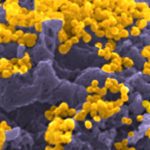Link to Pubmed [PMID] – 19667061
J. Exp. Med. 2009 Aug;206(9):1853-62
CD4(+)CD25(+)Foxp3(+) natural regulatory T cells (T reg cells) maintain self-tolerance and suppress autoimmune diseases such as type 1 diabetes and inflammatory bowel disease (IBD). In addition to their effects on T cells, T reg cells are essential for maintaining normal numbers of dendritic cells (DCs): when T reg cells are depleted, there is a compensatory Flt3-dependent increase in DCs. However, little is known about how T reg cell homeostasis is maintained in vivo. We demonstrate the existence of a feedback regulatory loop between DCs and T reg cells. We find that loss of DCs leads to a loss of T reg cells, and that the remaining T reg cells exhibit decreased Foxp3 expression. The DC-dependent loss in T reg cells leads to an increase in the number of T cells producing inflammatory cytokines, such as interferon gamma and interleukin 17. Conversely, increasing the number of DCs leads to increased T reg cell division and accumulation by a mechanism that requires major histocompatibility complex II expression on DCs. The increase in T reg cells induced by DC expansion is sufficient to prevent type 1 autoimmune diabetes and IBD, which suggests that interference with this feedback loop will create new opportunities for immune-based therapies.
